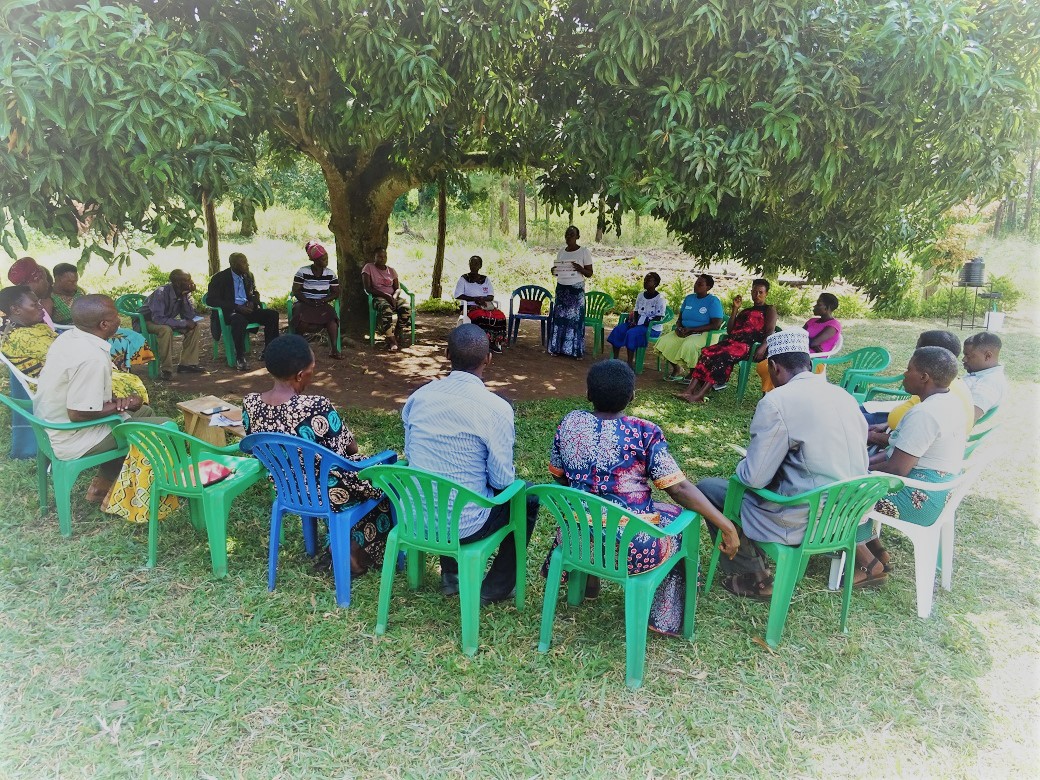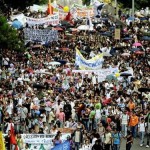Solidarity letter with the Peoples National Agricultural Strike convened by the Colombian people
Indigenous peoples organizations, NGOs, citizens of countries on all continents, members of the Global Forest Coalition (Global Forest Coalition, GFC[1]), express our strong support and solidarity with the Colombian peoples convened by the «Popular and Agrarian Strike», especially rural people, workers and local communities suffering the impacts of agricultural and trade policies on their livelihoods and means of production, as well as the violation of their fundamental rights, which have forced them to mobilize massively through the country’s farmlands, roads and cities.
The Agricultural Strike and the actual popular mobilizations in Colombia, have given current visibility and relevance to the debate about the unsustainable economic and social model inflicted in that country, not only among the Colombian population, but internationally, just like us, individuals and organizations constantly looking at what happens on that territory.
We are immensely restless given that the environmental, economic, political and social crises in Colombia – and other countries in the region – are not recognized by the current government, as at it was initially done by President Juan Manuel Santos who denied and ignored the existence of the national strike.
The structural causes of these crises are related to: the imposition of neoliberal policies that have intensified the re-primarization of the Colombian economy, with emphasis on extractivism (mining, oil, forestry, agriculture) and the signing of Free Trade Agreements (FTAs) clearly unfavorable for small producers in the country, which the government continues to sign on (agreements such as that one carried out with China despite the evidence of its harmful effects); land grabbing and unequal concentration of land tenure, the benefits and protection of the interests of transnational corporations disregarding food and energy sovereignty and the fundamental rights of Colombians, which are also threats to other Latin American countries.
The agro-industrial model is occupying vast areas of the Colombian geography, process in which Colombian and transnational companies de-territorialize peasant farmers, indigenous peoples and afro-descendants. A case that exemplifies land grabbing and selling off of the land to foreigners system is that of the transnational Cargill, which ‘appropriated’ 50,000 hectares in the department of Vichada in order to plant soybeans and corn, using transactions that created several companies, breaking law 160 1994[2].
However, from abroad, citizens, organizations, communities and foreign peoples, understand and perceive clearly the structural causes of the mobilization and the current strike in Colombia. We express our deep concern about the strike that continues in various regions and country roads, as well as the violent means that the state’s security forces are using to try to break up the mobilizations putting at high risk the lives of community members participating in the strike, as it is currently happening on the day we issue this letter in the departments of Cauca and Nariño. We believe it is an outburst the fact that the Colombian government is negotiating peace while it is violently oppressing its people. No peace is possible without land; peace is not possible while social injustice exacerbates, nor while the causes of the strike are neglected, which maintain thousands of Colombians in a deplorable and outrageous situation.
We strongly condemn the repressive and stigmatizing response against the right to protest, especially the excessive use of force and violence by the state’s security forces against the population, people in a position of helplessness or conditions of inequality, acts that have been perpetrated mainly by the anti-riot police ESMAD. We condemn the persecution of organizations and peasant leaders, the detention of Fensuagro Vice President, Hubert Ballesteros. Criminalization, arrests and attacks on journalists have been another quick reply from the government, while their responses to legitimate popular requirements and demands have a phlegmatic pace.
That situation is impossible to hide before anyone who is watching, it has generated the broad the support of urban populations to the strike and its participants, and at the same time it has risen the concern and solidarity reactions from diverse sectors of the world’s population, in spite of the misinformation and lack of serious, ethical and responsible coverage by the Colombian media.
In this regard, we call for international solidarity and demand the Colombian government:
To stop the excessive use of force and violence against the population, as well as the criminalization and all forms of repression and coercion of peaceful social protest;
To investigate and punish those individuals from the states’ security forces and other state actors responsible for human rights violations;
To listen to and solve the requirements and demands of the popular sectors and peasant farmers thus creating spaces to include the demands of small farmers, both men and women;
To issue comprehensive and consistent proposals and solutions and not mitigating or using smoke screens, in this regard, for instance, FTAs need to be terminated since they are keeping the dairy sector and other productive sectors of the country in bankruptcy. The Colombian countryside has fed its people for decades and with due support can continue to do so.
To eliminate Law 970 that aims to control the use of native seeds, and instead promote practices for strengthening native seed varieties.
We call for a transparent negotiation process that responds and meets the needs and proposals of social movements, peasants and other popular sectors, rather than government needs to muddle through the crisis and perpetuate inequality. This negotiation must move forward together with legitimate delegates that represent all mobilized sectors, and not divided into sectors and in a biased manner, which without any doubt, seeks to decrease the scope of the protest and spoils the opportunity to find a comprehensive solution to the multiple crises that are drowning the country’s population.
Finally, we call all environmental, indigenous peoples and human rights organizations, among others, as well as communities and overall international population, to remain vigilant to the sensitive situation in Colombia and make effective our solidarity and support. Thus, accompanying the struggle of those who, with their work and resistance, have guaranteed the defense of territories, the natural and cultural Colombian heritage, legacy that we recognize and value as ample and diverse.
Among the actions that can help materialize this support are: sending letters of solidarity expressing increased international support and monitoring the situation in Colombia. These letters are aimed at:
Presidencia de la República: webmaster@presidencia.gov.co
Procuraduría General de la Nación: quejas@procuraduria.gov.co
Fiscalía: contacto@fiscalia.gov.co;denuncie@fiscalia.gov.co
Ministerio del Interior y de Justicia: serviciociudadano@mininterior.gov.co
Defensoría del Pueblo: sat@defensoria.org.co; sat.centrooriente@gmail.com;
with copy to: energia@censat.org
Endorsements:
L’Université Nomade – France
Women International for a Common Future (WECF/WICF) – Germany
Women in Agriculture and Environment (SWAGEN) – Uganda
Red de Educación Popular Entre Mujeres de Latinoamérica y Caribe REPEM LAC – Colombia
CEAMUJER – Nicaragua
Center for Women’s Global Leadership, Rutgers University – U.S.
Development Alternatives with Women for a New Era (DAWN) – Thailand
Biofuelwatch – UK & U.S
Asociación Indigena Ambiental y la Alianza Mundial de Pueblos Indigenas de Bosques Tropicales – Panamá
The Woodlandleague – Ireland
Friends of the Siberian Forests – Russia
Global Diversity Foundation – UK
[1] The Global Forest Coalition (GFC) is an international coalition of NGOs and Indigenous Peoples’ Organizations defending social justice and the rights of forest peoples in international forest policies. see: www.globalforestcoalition.org
[2] Further info: http://www.semillas.org.co/sitio.shtml?apc=w–1–&x=20158421











